#David Kennerly
Photo

Mia Farrow by David Kennerly, 1969
1K notes
·
View notes
Text
A fotóriporter, a Canon és Robert Capa
A fotóriporter, a Canon és Robert Capa
David Kennerly
>Fotóhősök. Dirck Halstead haveromnak volt egy utolsó kívánsága. Tegnap teljesült. Hamvait hősének, Robert Capának a sírjánál szórtuk szét az Amawalk Hill temetőben, Amawalkban, New Yorkban. 16 éves korában Dirck fotózta Capa temetését. Egész pályafutása során Capa nyomdokaiba lépett. Hamvainak egy részét is elhelyeztem egy kis Canon fényképezőgép akkumulátoros tartályában és…

View On WordPress
0 notes
Text
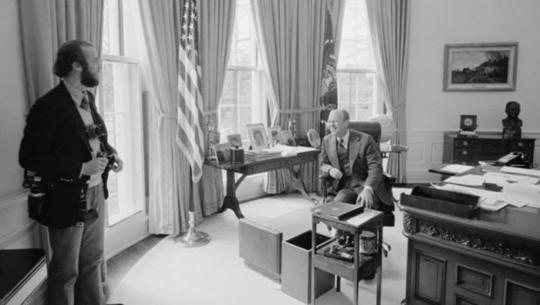
Awash in conflicting reports from unstable battlefronts, [President Gerald] Ford wanted a firsthand appraisal [on the situation in Vietnam] from someone he could trust. General [Frederick] Weyand was his chosen emissary. "You are not going over to lose," he instructed Weyand, "but to be tough and see what we can do." Ford conceded that any military options were severely limited. "I regret I don't have the authority to do some of the things President Nixon could do," he remarked wistfully. As the Oval Office emptied, photographer David Kennerly stayed behind. "You know, I would really like to go with the General," he said. Ford needed no persuading. As a journalist, and a friend, with extensive knowledge of the region from his two-year stint as a combat photographer for UPI, Life and Time, Kennerly could be counted on for an honest assessment of events -- more honest, perhaps, than that of diplomats and military men -- and with it, the pictures to back him up. Kennerly returned to his first-floor office with a sign dangling from his neck. GONE TO VIETNAM. BACK IN TWO WEEKS.
That evening the irreverent photo hound dubbed Hot Shot by the Secret Service appeared in the upstairs family quarters to say goodbye. Ford threw a protective arm around the young man's shoulders.
"You be careful. You have everything you need?"
As a matter of fact, Kennerly's pockets were empty. Local banks were closed and he could use some cash. Ford opened his wallet and handed over its contents, $47, as Betty Ford gave Kennerly a hug. He was striding toward the door when the President called out his name. "Here," said Ford, tossing Kennerly a quarter. "You might as well clean me out."
-- Richard Norton Smith, on White House photographer David Hume Kennerly's interactions with President Gerald Ford after Kennerly asked to accompany a General on a fact-finding mission to Vietnam in March 1975, shortly before the Fall of Saigon, An Ordinary Man: The Surprising Life and Historic Presidency of Gerald R. Ford (BOOK | KINDLE | AUDIO)
#History#Presidents#Gerald Ford#President Ford#Ford Administration#Gerald R. Ford#David Hume Kennerly#White House Photographers#Presidential History#Vietnam#Vietnam War#Richard Norton Smith#Books About Presidents#Presidential Biographies#An Ordinary Man: The Surprising Life and Historic Presidency of Gerald R. Ford#An Ordinary Man#Presidency#White House History#HarperCollins#Betty Ford#First Ladies#Ford Family#Fall of Saigon#Vietnam War History#Operation Frequent Wind
14 notes
·
View notes
Photo

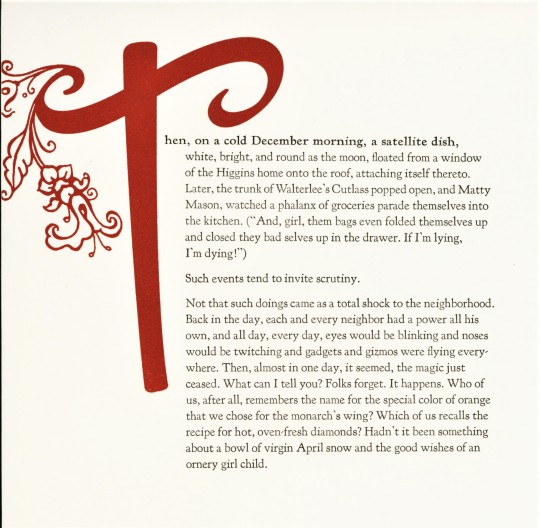






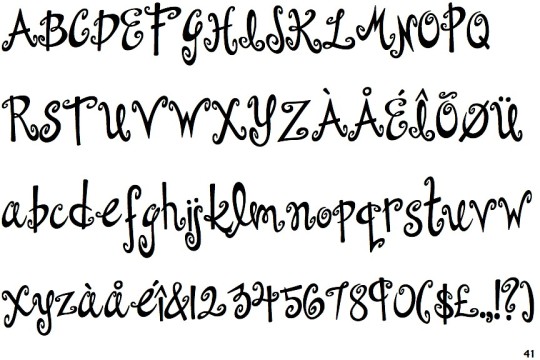
Typography Tuesday
DOLLHOUSE
We thought we would begin the year whimsically on this first #Typography Tuesday of 2023. So today we present a display font called Dollhouse designed by Kristen Faulkner in 1995 for House Industries. Soon after the font’s release, the Minnesota Center for Books Arts (MCBA) selected Dollhouse as the display face for their 1998 Winter Book The Everyday Magic of Walter Lee Higgins by David Haynes, printed by MCBA artistic director at the time Mary Jo Pauly in an edition of 125 copies. The text font is Kennerly from M&H Foundry in San Francisco, and the digital Dollhouse initials are rendered here as linocuts.
Other fonts Faulkner has designed for House Industries all have the word “house” in them, including Housecut (1994), Housemaid (1994), Outhouse (1994), Springhouse (1995), and Itchyhouse (1995).
View more Typography Tuesday posts.
#Typography Tuesday#typetuesday#Typography Tuesday#Dollhouse type#type designers#women type designers#Kristen Faulkner#House industries#Minnesota Center for Book Arts#MCBA#David Haynes#Mary Jo Pauly#The Everyday Magic of Walter Lee Higgins#Kennerly type#M&H Foundry#M & H Type#fine press books
37 notes
·
View notes
Text
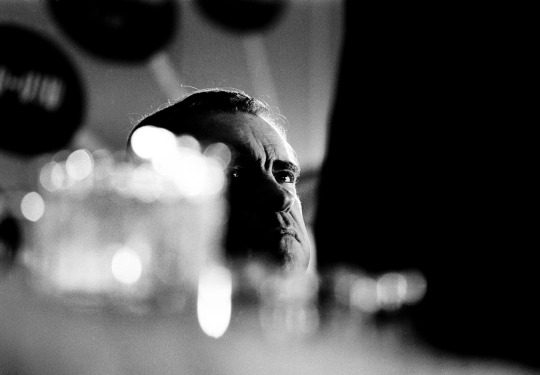
Richard Nixon, January 9, 1913 – April 22, 1994.
1974 photo by David Hume Kennerly.
5 notes
·
View notes
Text
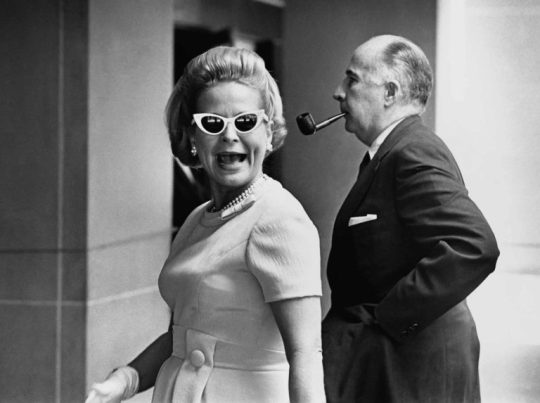
Martha Mitchell and her husband Attorney General John Mitchell.
Photo by David Hume Kennerly from 50th Anniversary of the Watergate Break-in
5 notes
·
View notes
Photo
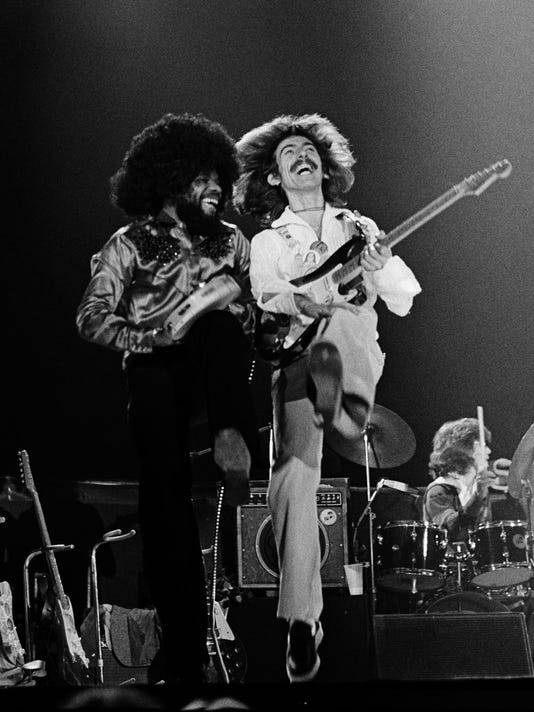
Onstage during the Dark Horse Tour, December 1974; photo by David Hume Kennerly/Getty Images.
“We became like brothers, very close. [...] [George] was a very, very loving person, a great guy. [...] He had such a heart. [...] He was very unaffected by the fame. He just loved God and his family and his friends.” - Billy Preston, WBUR, November 30, 2001
“[When The Beatles first met Billy Preston in Hamburg] Billy was so young George said you could hardly see his head over the Hammond organ. They had a connection — like brothers. His mother used to call George her paler son.” - Olivia Harrison, Concert for George ltd. ed. book
“[Billy] used to play with George a lot in his studio at home in England and he had Billy's [Hammond] B3. We just called it 'Billy's B3.' Billy would sit and dance on that seat and on the pedals of that organ. He really did. His seat would just dance across there, he was just amazing. Such a sweet man. So gentle and what a talent. He had absolute fluidity on that organ and on any keyboard really.” - Olivia Harrison, Billboard, April 3, 2017
“[George is] a very emotional guy; he’s very spiritual and sensitive. He’s a very kind-hearted person. […] We feel like we’re together all the time, just through spirit.” - Billy Preston, Ticket To Ride: A Celebration Of The Beatles (1989)
“[Billy Preston]’s a tremendous inspiration to work with.” - George Harrison, Disc & Music Echo, July 5, 1969
“Billy Preston, man — Billy Preston, I just love him. I never wanna play in another band without Billy. I mean, I hope I don’t ever have to.” - George Harrison, KLOL, November 1974 (x)
#Billy Preston#George Harrison#quote#quotes about George#quotes by George#Olivia Harrison#George and Billy Preston#Friar Park#1974#1970s#fits queue like a glove
67 notes
·
View notes
Text
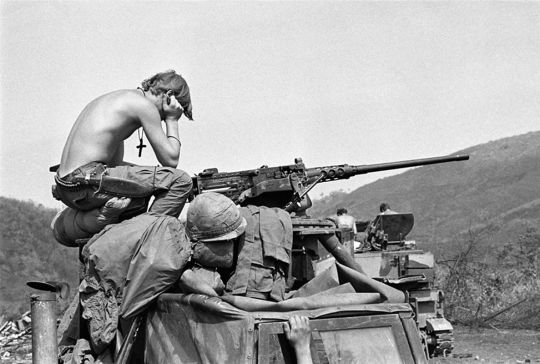
by David Hume Kennerly
* * *
PLEASE DON’T THANK ME FOR MY SERVICE THIS VETERAN’S DAY
NOV 11, 2023
Please don't thank me for my "service." I was in the military, not the "Service." Service is doing something good. Service is what the person does who fixes your car. When the word "service" is applied to the military, it helps to justify violence as a method for conflict resolution. Like "defending our freedom," or "bringing democracy," the word "service" is used to lower the barriers of aggression. The military solution to conflict is death and destruction. That's not "service." Call it what it is - the military. If you have to hurt someone to solve a problem, you are the Problem. -- Arnold Stieber, US Army Veteran, 1970
I have absolutely no problem understanding exactly what Mr. Stieber wrote above, “back in the day,” with the white-hot heat of youth and the thorough pissed-offness of someone who had seen the side of life nobody ever wants to see. It’s the attitude I came home with from that same war, five years before he did.
I’ve never really gotten used to the new tradition of the past 30 years, for civilians - on discovering they are in the presence of someone who served in the military, - to say “Thank you for your service.” I have very mixed emotions about that. On the one hand, it’s nice that maybe a fourth of them have a clue why they’re saying what they are, that it isn’t merely the mouthing of polite words. On the other hand, I’m not sure why anyone would want to thank someone who served in the war I served in, or the ones that followed.
The war in Vietnam made everything in America worse. For just one thing, it harmed the economy when the government adopted a policy of both “guns” and “butter,” which led to the severe inflation of the 1970s, which gave companies looking for any way to reduce costs to start taking a hard line on employee compensation, which leaves us in the condition where the average American working stiff now makes less in terms of buying power than they did 50 years ago, I don’t know about you, but I’m not up to thanking anyone for that.
Of course, thinking further on this leads one to the obvious conclusion that it wasn’t the kids who got drafted who did any of that. They weren’t sitting in the halls of government thinking about how to distract the citizenry from the fact that this particular imperial war was going bad in all ways, and coming up with the idea of keeping taxes down in a period of increased government spending for things that go “BOOM!” while making sure they could get that new car every three years like they always did. Those decisions are the ones that led to the situation I mentioned above. Made by guys who mostly never got shot at, even in the war they did serve in.
In my experience during my time in the Navy and the years after knowing other vets and working with them, there were very few of us who “wanted” to go to war. Most of my fellow sailors were in the Navy because they figured joining the Navy and getting trained for a good job and “seeing the world” beat the daylights out of being in the Army, so much so it was worth a couple extra years over the two years a draftee served. Ditto the Air Force. Even the Marines were forced to start taking draftees after 1966, when they ran low on guys who believed what John Wayne told them in “Sands of Iwo Jima.”
As close as anyone got to “wanting” to go was when those of us who had joined before the war received the first orders sending us to the war. As my friend Phil Caputo wrote in “A Rumor of War” (a “Vietnam book” you should read), when he learned he and his fellow Marines were headed to DaNang in South Vietnam in 1965, “I thought to myself that when it was over and I went home, I’d be able to look my Tarawa-veteran father in the eye.” I know many others - including me, son of the guy who survived the Kamikazes - the sons of the “greatest generation” who had grown up with all the stories about our father’s “good war,” who “played war” with the cast-off gear from that war, who had similar thoughts.
Vietnam was the last war fought with draftees, and you can bet your bottom dollar today’s leaders will never go back to that system. The draft made everyone think about the war, whether they had to worry about getting drafted out of whatever working class job they had (or didn’t have); even the kids with student deferments had to think about the war when they didn’t work hard enough to keep their grades up and maintain their 2-S status. Mothers and fathers and aunts and uncles and brothers and sisters and friends all had to worry about someone they knew and loved going off to that war. Whether they “supported the president” or came to understand that the war wasn’t worth the loss of that life they knew and loved, they came in the middle of the night to hate the war. And eventually that made itself known in politics. The makers of war became constrained in the war they could make by the lack of support from those who gave them their jobs with their votes.
I’ll tell you something. After I came back, I did all I could to end that draft. But I would be very happy to see it brought back today.
No deferments. The sons and daughters of the rich serve right alongside the sons and daughters of the poor - like they did in World War II. It’ll make the entitled little shits into something better. And it really does unify - it’s hard to hate people you know by name.
But mostly I’m in favor of that because it makes it almost impossible for “They” to decide to fight a 20 year war in Afghanistan, or Iraq. They can’t do it because too many people will be paying attention. And getting pissed off at them. And voting.
But no, for exactly the reasons I am for the draft, the “all-volunteer” army is here to stay. You can’t fight 20-year wars in hellholes nobody knows without it. That way, only about 1-2 percent of the population ever has to think about the war - the kids who join up because they don’t have a future that looks better than what the military offers, their families, their friends - not a big enough group that if they got upset they could muster any political changes, unlike all those folks 50 years ago.
Most of all, if you’re going to thank me or any of us for our service, don’t try to honor us as “heroes.” For one thing, most of us aren’t, and for another, if you haven’t been in the military you really have no idea what being a hero in that context actually is.
It’s not what you think it is.
An old Navy Chief once explained “being a hero” to me: “When you’re so terrified that your brain is so frozen you can’t think, and you’ve pissed your pants and shit your drawers, and you just know you’re going to die, and you still do your job - THAT is being a hero.”
Not the definition too many in our society nowadays want to hear.
“But, Tom,” you say, “don’t you write all these best-selling books about wars and heroes? You must really love war to think about it so much.”
If you have gotten anything even remotely like that from reading any of my books, you really need to reconsider that decision not to take that remedial course in reading comprehension.
Yes, I do honor those out there in the mud and the blood and the ooze. And I appreciate knowing the ones who were out there in the mud and the blood and the ooze and survived to come back to the world of the living. That’s because their willingness to do that has a lot to do with why there is that world of the living to come back to.
Or at least that’s true in the World War II books. That’s the last war that could be divided into the Good Guys and the Bad Guys.
Except it kind of can’t. I’ve known too many guys who served on “the other side” who are just as nice - if not nicer - than anyone I have met from “the good side.”
In fact some of them must be better than anyone who served on this side. That’s a small list. But every guy who served in Vietnam and then had the opportunity to later meet the people they were trying to kill at the time, has met people who have been willing to forgive them for My Lai and Agent Orange and Rolling Thunder and all the rest of it, and offer friendship. And the ones on that side who I have been privileged to meet are definitely honorable men.
A late friend of mine who was a leading ace in “the good war” once told me when we were at a convention of those guys and the honored guests at the event were the guys who they’d been out to kill: “The secret nobody knows is, we always thought the guys we were fighting were the only ones who knew what we were going through. We actually thought we were closer to them than to the other people who were on our side.” I’ve heard similar sentiments from former infantrymen as well as former fliers, so it’s not some “guild of the elite” or “honorable brotherhood.”
Although it probably is an “honorable brotherhood.” The brotherhood of people who were willing to do what it took to defend what they loved - and believe it or not that even applies to the Germans; most of them knew as much about the “larger issues” going on, the terrible things, as any young guy in the US military did in the war I fought. And when they did find out, they were shocked too. The people who did the terrible things tried to keep them secret from everyone else, because they knew they were doing terrible things.
My friend Jim Wright, who’s become well-known in social media in recent years for some straight-shooting talk from a retired Chief Warrant Officer, wrote:
“Mostly we veterans are just people who came when called and did our best under terrible circumstances.”
I’ll end with a quote from a guy who did know what it took to do all that stuff:
“Every gun that is made, every warship launched, every rocket fired signifies in the final sense, a theft from those who hunger and are not fed, those who are cold and are not clothed. This world in arms is not spending money alone. It is spending the sweat of its laborers, the genius of its scientists, the hopes of its children. This is not a way of life at all in any true sense. Under the clouds of war, it is humanity hanging on a cross of iron.”
― Dwight D. Eisenhower, Soldier, General, President
[TCinLa :: Thats Another Fine Mess]
#war#the draft#history#Vietnam#soldiers#veterans#thank you for your service#the military#the military industrial complex#Dwight D. Eisenhower#TCinLA#Thats Another Fine Mess
21 notes
·
View notes
Text
Betty Ford, "So I took off my shoes, hopped up there, and struck a pose."
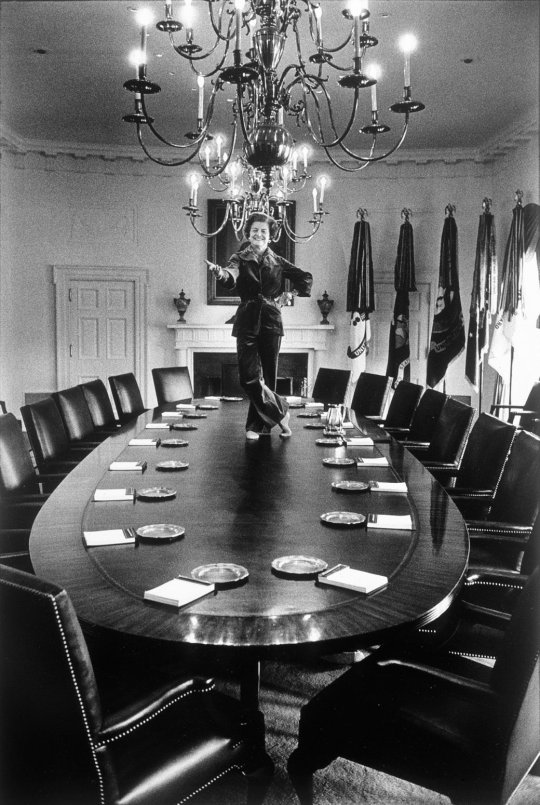
January 19, 1977
"....I passed by the empty Cabinet Room and thought, 'You know, I've always wanted to dance on the Cabinet Room table.'"
Photographer, David Hume Kennerly: "When she voiced her idea about dancing on the Cabinet Room table to him, he recalls, "I said, 'Well, nobody's around.'"
13 notes
·
View notes
Photo
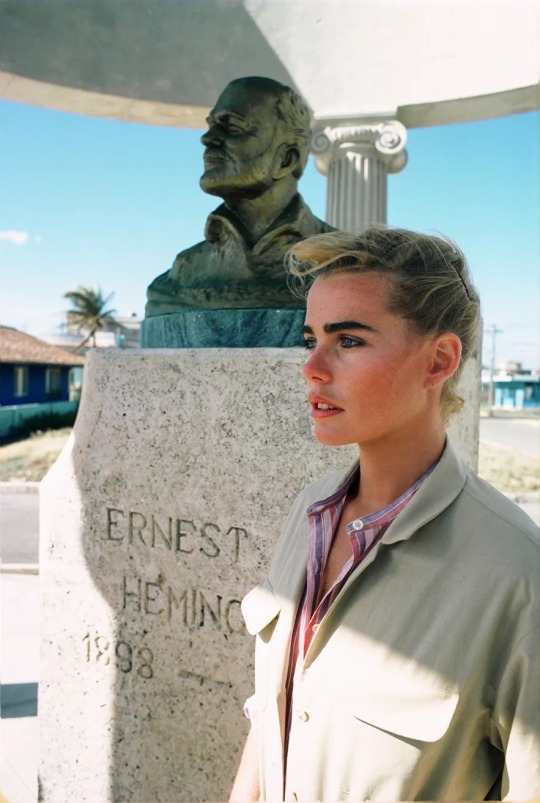
Margaux Hemingway in Cuba by David Hume Kennerly, 1978
61 notes
·
View notes
Text
A key reason Liz’s nomination was turned down was your agita about what might happen if the former president is reelected. Some of you raised the specter of being attacked by the Internal Revenue Service and losing the foundation’s tax-exempt status as retribution for selecting Liz for the award. The historical irony was completely lost on you. Gerald Ford became president, in part, because Richard Nixon had ordered the development of an enemies list and demanded his underlings use the IRS against those listed. That’s exactly what the executive committee fears will happen if there’s a second coming of Donald Trump. Did LT Gerald Ford meet the enemy head-on because he thought he wouldn’t get killed? No. He did it despite that possibility. This executive committee, on the other hand, bolted before any shots were fired. You aren’t alone. Many foundations, organizations, corporations, and other entities are caught up in this tidal wave of timidity and fear that’s sweeping this country. I mistakenly thought we were better than that. This is the kind of acquiescent behavior that leads to authoritarianism. President Ford most likely would have come out even tougher and said that it leads directly to fascism.
Those of you who rejected Liz join many “good Republicans” now aiding and abetting our 45th president by ignoring the genuine menace he presents to our country. America is fortunate to have Liz Cheney still out there on the front lines of freedom vigorously defending our Constitution and democratic way of life. But you don’t have her back. In failing to honor Liz’s courage, resolve, and integrity, you are retreating and hunkering down behind a wall of silence. Martin Luther King said, “In the end, we will remember not the words of our enemies, but the silence of our friends."
0 notes
Text
0 notes
Text
0 notes
Text
0 notes
Text
David Hume Kennerly resigns from Gerald Ford foundation board over refusal to honor Liz Cheney with top award | CNN Politics
1 note
·
View note
Link
0 notes